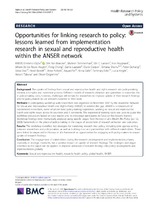| dc.contributor.author | Ogbe, Emilomo | |
| dc.contributor.author | Cooper, Diane | |
| dc.date.accessioned | 2019-08-19T06:44:40Z | |
| dc.date.available | 2019-08-19T06:44:40Z | |
| dc.date.issued | 2018 | |
| dc.identifier.citation | Ogbe et al. (2018). Opportunities for linking research to policy: lessons learned from implementation research in sexual and reproductive health within the ANSER network. Health Research Policy and Systems, 16(123). https://doi.org/10.1186/s12961-018-0397-7 | en_US |
| dc.identifier.issn | 1478-4505 | |
| dc.identifier.uri | https://doi.org/10.1186/s12961-018-0397-7 | |
| dc.identifier.uri | http://hdl.handle.net/10566/4793 | |
| dc.description.abstract | Background: The uptake of findings from sexual and reproductive health and rights research into policy-making
remains a complex and non-linear process. Different models of research utilisation and guidelines to maximise this
in policy-making exist, however, challenges still remain for researchers to improve uptake of their research findings
and for policy-makers to use research evidence in their work.
Methods: A participatory workshop with researchers was organised in November 2017 by the Academic Network
for Sexual and Reproductive Health and Rights Policy (ANSER) to address this gap. ANSER is a consortium of
experienced researchers, some of whom have policy-making experience, working on sexual and reproductive
health and rights issues across 16 countries and 5 continents. The experiential learning cycle was used to guide the
workshop discussions based on case studies and to encourage participants to focus on key lessons learned.
Workshop findings were thematically analysed using specific stages from Hanney et al.’s (Health Res Policy Syst 1:2,
2003) framework on the place of policy-making in the stages of assessment of research utilisation and outcomes.
Results: The workshop identified key strategies for translating research into policy, including joint agenda-setting
between researchers and policy-makers, as well as building trust and partnerships with different stakeholders. These
were linked to stages within Hanney et al.’s framework as opportunities for engaging with policy-makers to ensure
uptake of research findings.
Conclusion: The engagement of stakeholders during the research development and implementation phases,
especially at strategic moments, has a positive impact on uptake of research findings. The strategies and stages
described in this paper can be applied to improve utilisation of research findings into policy development and
implementation globally. | en_US |
| dc.language.iso | en | en_US |
| dc.publisher | Springer Nature | en_US |
| dc.subject | Sexual and reproductive health | en_US |
| dc.subject | Research | en_US |
| dc.subject | Health policy | en_US |
| dc.subject | Global health | en_US |
| dc.subject | ANSER | en_US |
| dc.title | Opportunities for linking research to policy: lessons learned from implementation research in sexual and reproductive health within the ANSER network | en_US |
| dc.type | Article | en_US |

